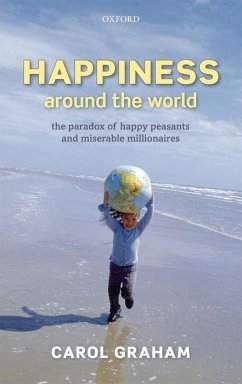For centuries the pursuit of happiness was the preserve of either the philosopher or the voluptuary and took second place to the basic need to survive on the one hand, and the pressure to conform to social conventions and morality on the other. More recently there is a burgeoning interest in the study of happiness, in the social sciences and in the media. Can we really answer the question what makes people happy? Is it really grounded in credible methods and data? Is there consistency in the determinants of happiness across countries and cultures? Are happiness levels innate to individuals or can policy and the environment make a difference? How is happiness affected by poverty? By economic progress? Is happiness a viable objective for policy? This book is an attempt to answer these questions, based on research on the determinants of happiness in countries around the world, ranging from Peru and Russia to the U.S. and Afghanistan. The book reviews the theory and concepts of happiness, explaining how these concepts underpin a line of research which is both an attempt to understand the determinants of happiness and a tool for understanding the effects of a host of phenomena on human well being. The research finds surprising consistency in the determinants of happiness across levels of development. Yet there is still much debate over the relationship between happiness and income. The book explores the effects of many mediating factors in that relationship, ranging from macroeconomic trends and democracy to inequality and crime. It also reviews what we know about happiness and health and how that relationship varies according to income levels and health status. It concludes by discussing the potential - and the potential pitfalls - of using happiness surveys to contribute to better public policy.

Die Glücksforschung kommt voran. Zwei neue Bücher zeigen: Glück ist nicht alles. Man muss auch reich und gesund sein.
VON PATRICK BERNAU
Es ist schon seltsam mit dem Glück. Afghanistan ist vom Krieg gezeichnet, die Menschen müssen sich vor Anschlägen fürchten, sie plagen sich mit Kriminalität und Korruption - aber besonders unglücklich sind sie trotzdem nicht. Zwar kommen sie nicht ganz an den Weltdurchschnitt des Glücks heran, aber es geht ihnen auch nicht viel schlechter als den Menschen im vergleichsweise friedlichen Lateinamerika.
Das ist das große Paradox der Glücksforschung. Seit 40 Jahren ergründen Forscher, wann Menschen sich gut fühlen. Sie wollten herausfinden, welches Leben das beste ist - jetzt merken sie: Auch wer glücklich ist, hat nicht unbedingt ein gutes Leben. Glücklich machen ein gutes Abendessen und ein Treffen mit Freunden. Aber kann das alles sein?
Nein, zum guten Leben gehört zum Beispiel auch Geld, wie das Buch der Ökonomin und Politikwissenschaftlerin Carol Graham zeigt. Sie bestätigt zwar einmal mehr, dass Reichtum die Menschen nur selten glücklich macht. Er hilft nur denen, die reicher sind als andere Leute in ihrer Umgebung. Wenn die Wirtschaft im ganzen Land wächst, ändert sich am Glück im Land nichts.
Und doch ist das nicht alles, was zählt. Denn Menschen können fröhlich sein, obwohl sie mit ihrem Leben unzufrieden sind. Und diese Zufriedenheit verbessert sich durch Wirtschaftswachstum sehr wohl, wie zwei unterschiedliche Forscherteams gezeigt haben. Das gilt sogar für reiche Länder. Zwar helfen zehn zusätzliche Euro einem Armen mehr als einem Reichen. Aber meist wird ja nicht in Euro über Lohnerhöhungen verhandelt, sondern in Prozent. Auch das Wirtschaftswachstum wird prozentual gemessen. Und wer um zehn Prozent reicher wird, dessen Lebenszufriedenheit steigt durchschnittlich immer gleich stark: egal, ob er arm oder reich ist.
Wer ein gutes Leben haben will, braucht also nicht nur Glück, sondern auch Geld. Und Gesundheit obendrein - denn die macht auch nicht glücklich. An Krankheiten und Behinderungen gewöhnen sich Menschen meist innerhalb von wenigen Monaten, danach sind sie so glücklich wie zuvor.
Ob Geld, Krankheiten oder Kinder - all das macht wenig aus. Ob ein Mensch glücklich oder unglücklich durchs Leben geht, ändert sich langfristig kaum. Die Hälfte des Glücksgefühls ist vererbt.
Die andere Hälfte lässt sich aber trotzdem verbessern. Wie das geht, sagt Derek Bok, ehemaliger Präsident der Eliteuniversität Harvard. Er fragt vor allem danach, was Politiker tun können. Denn die Menschen fänden ihr Glück oft nicht selbst. Die Einwohner reicher Industrieländer könnten zum Beispiel viel fröhlicher sein, wenn sie ihre Freizeit richtig nutzten. Sex und Freunde, auch Sport machen fröhlich - doch stattdessen setzen sich die meisten stundenlang vor den Fernseher. Angesichts dessen könnten sie ihre Laune sogar schon verbessern, indem sie länger bei der Arbeit bleiben und dort mit den Kollegen sprechen.
Also gibt es viel zu tun, stellt Bok fest. Kinder könnten in der Schule lernen, wie man leichter glücklich wird. Und die Medizin sollte künftig eher die Leiden besser behandeln, an die man sich nie gewöhnt: Schlafstörungen, Depressionen und chronische Schmerzen.
Bok hat noch mehr Vorschläge. Aber bei so manchem fühlt er sich selbst schon an den Schriftsteller Aldous Huxley erinnert: Der beschrieb in einem Buch die "Schöne neue Welt", in der alle gut drauf waren - aber niemand mehr wirklich etwas fühlte oder dachte.
Carol Graham: "Happiness Around the World". Oxford University Press, ca. 18 Euro.
Derek Bok: "The Politics of Happiness". Princeton University Press, ca. 20 Euro.
Alle Rechte vorbehalten. © F.A.Z. GmbH, Frankfurt am Main

